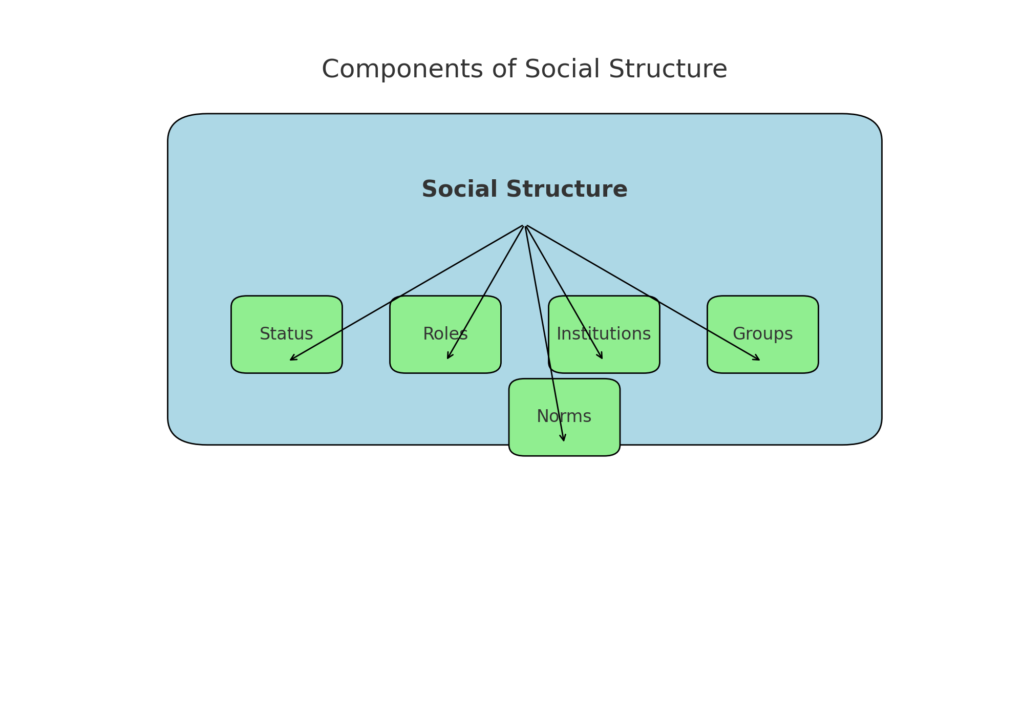Introduction:
Social structure may sound like an abstract concept reserved for sociologists but in reality it shapes every individual’s life in profound ways. From the moment we are born we enter a world governed by systems of norms, roles and institutions that guide how we live, work and relate to others. Understanding how social structure operates is not only valuable for academics it is essential knowledge for anyone who wishes to navigate society effectively, challenge injustice and create positive change.
Navigating Society More Effectively:
Every society functions according to a set of rules and expectations. These rules are expressed through social norms, roles, and institutions such as the family, education and government. When people understand these structures, they are better able to adapt to social expectations whether it is learning workplace professionalism, fulfilling family responsibilities or respecting cultural traditions. They also become more aware of the consequences of breaking norms, from legal penalties to social disapproval and can make more informed decisions about their actions. At the same time, knowledge of social structures allows individuals to recognize opportunities and use established pathways, such as education, networking or mentorship, to achieve their goals. In this sense, understanding social structure is like learning the “rules of the game,” which makes navigating life far more effective and confident.
Recognizing and Challenging Inequality:
Social structures do not affect everyone equally. They often reinforce privilege for some groups while creating disadvantages for others, whether through class, race gender or ethnicity. When individuals understand how these structures operate, they begin to see biases and inequalities that might otherwise remain invisible. For example, racism, sexism or classism are not simply the result of individual prejudice but are embedded within the larger systems of society. Awareness of these realities allows people to question unfair practices, advocate for justice and make choices in careers, politics or social activism that align with values of equality and inclusivity. In this way, understanding social structure transforms people from passive participants into critical thinkers capable of questioning and challenging injustice.
Improving Relationships and Communication:
Human life is built on relationships within families, workplaces and communities. When we understand how group dynamics and hierarchies work, we are better equipped to manage these relationships. For instance, in professional settings, awareness of roles and responsibilities makes collaboration more effective. Within families and communities, sensitivity to traditions and expectations strengthens bonds. Recognizing the role of power dynamics also helps reduce conflict, whether between managers and employees or between parents and children. Ultimately, understanding social structure encourages empathy, cooperation and the building of stronger, healthier human connections.
Encouragement of Personal Empowerment:
While it may seem that social structures only restrict us, in reality, understanding them can be deeply empowering. When people realize how norms and institutions influence their lives they gain the ability to act more strategically. This knowledge helps individuals resist stereotypes and break free from limiting expectations such as those tied to traditional gender roles. It opens doors to social mobility by encouraging the pursuit of education, skill development and opportunities that can overcome barriers of class or background. It also builds resilience against manipulation, whether through propaganda, misinformation or social pressure. Rather than being unconsciously shaped by structural forces individuals who understand them can take control of their own narratives and destinies.
Contributing to a More Just Society:
When people collectively develop awareness of social structures, the benefits extend beyond the individual to the whole society. Social change whether through civil rights movements, gender equality struggles or climate activism is fueled by the recognition that inequalities and challenges are rooted in structures rather than in personal shortcomings. Policymaking also improves when leaders understand that issues like poverty, unemployment or discrimination cannot be solved by blaming individuals but require systemic solutions. At the community level, this awareness nurtures inclusivity creating institutions and spaces that are fair and supportive for people of all backgrounds. In this way, understanding social structure contributes to building a society that is more just, equitable and sustainable.
Conclusion:
Social structure is far more than an abstract academic concept. It is the hidden framework that shapes our daily lives, opportunities, and relationships. By learning how it works, individuals can navigate society more effectively, challenge systemic injustices, improve their relationships, empower themselves and contribute to the creation of fairer communities. In today’s world, marked by rapid change, deep inequalities, and global challenges, understanding social structure is no longer optional it is essential for both personal success and collective progress.
As a Sociologist’s Concern:
“From a sociological perspective, social structure is not merely a background to human life it is the very framework that makes our interactions meaningful. When I observe society, I see patterns of norms, roles and institutions guiding behavior often silently. Understanding these patterns allows us to see why some people thrive while others struggle and why inequality persists despite individual efforts. To study social structure is to uncover the hidden architecture of society, making the invisible visible.”
Laraib Javaid:
Lecturer in Sociology, University of Sargodha
Director of Internship, Institute of International Peace Leaders


Comments